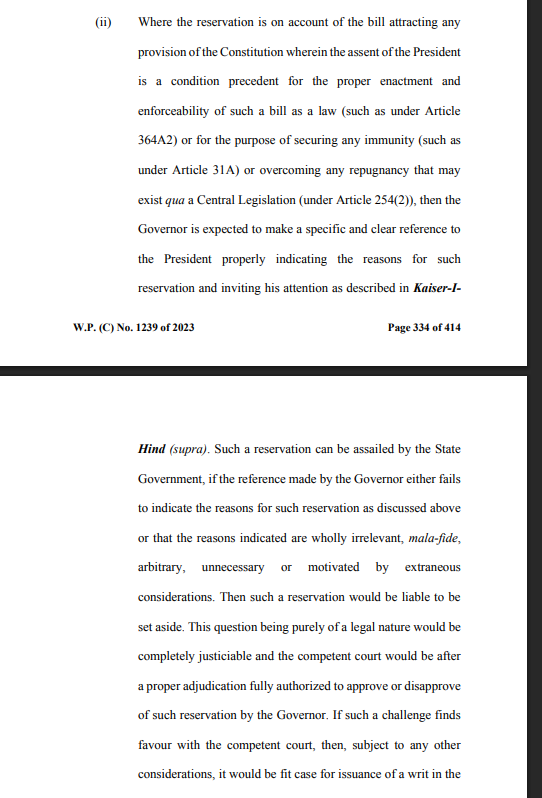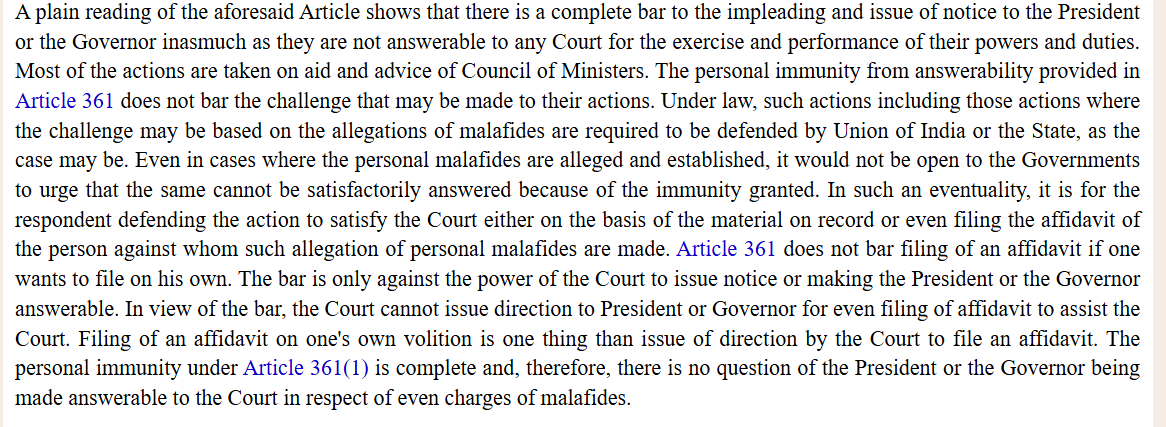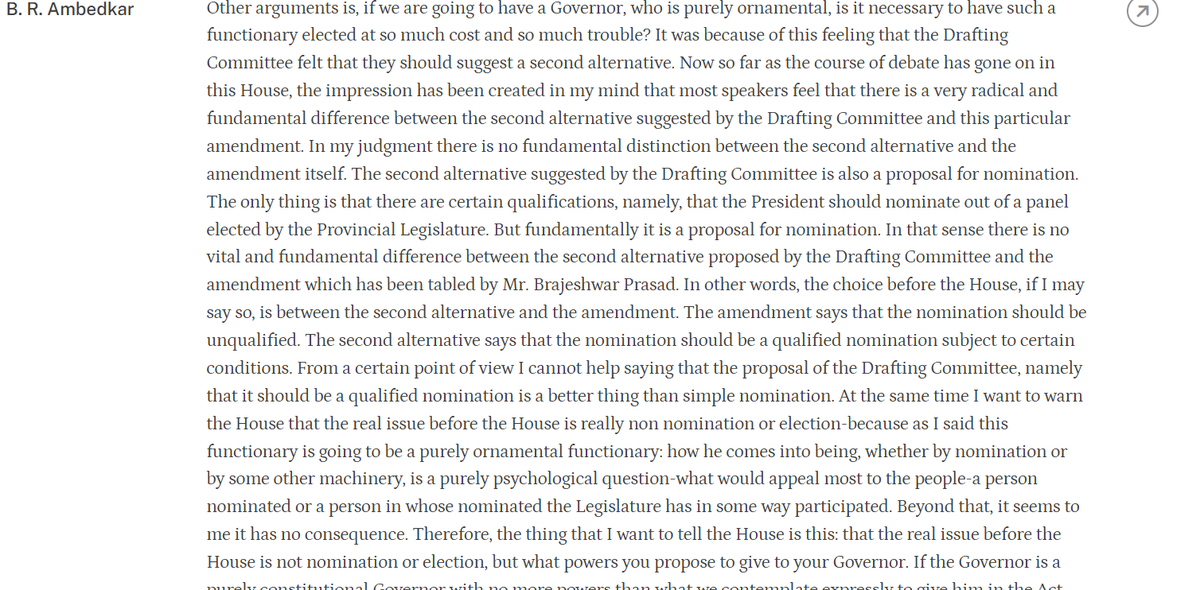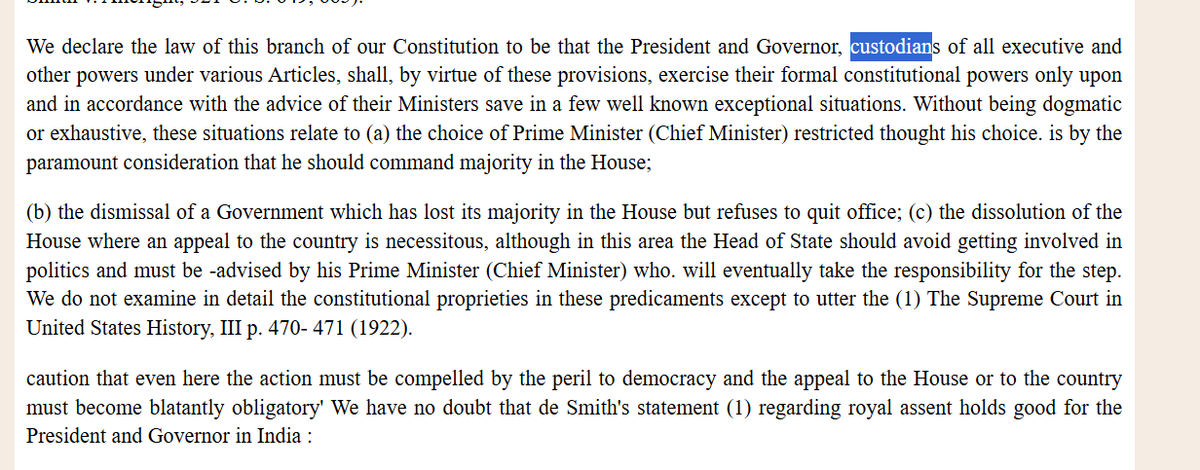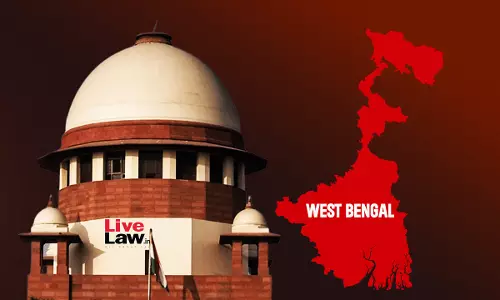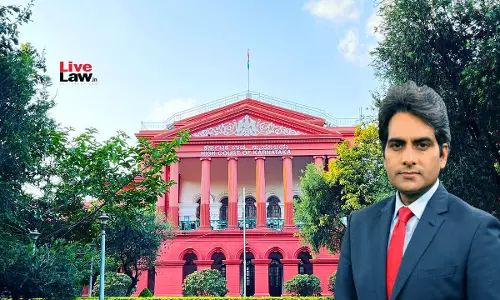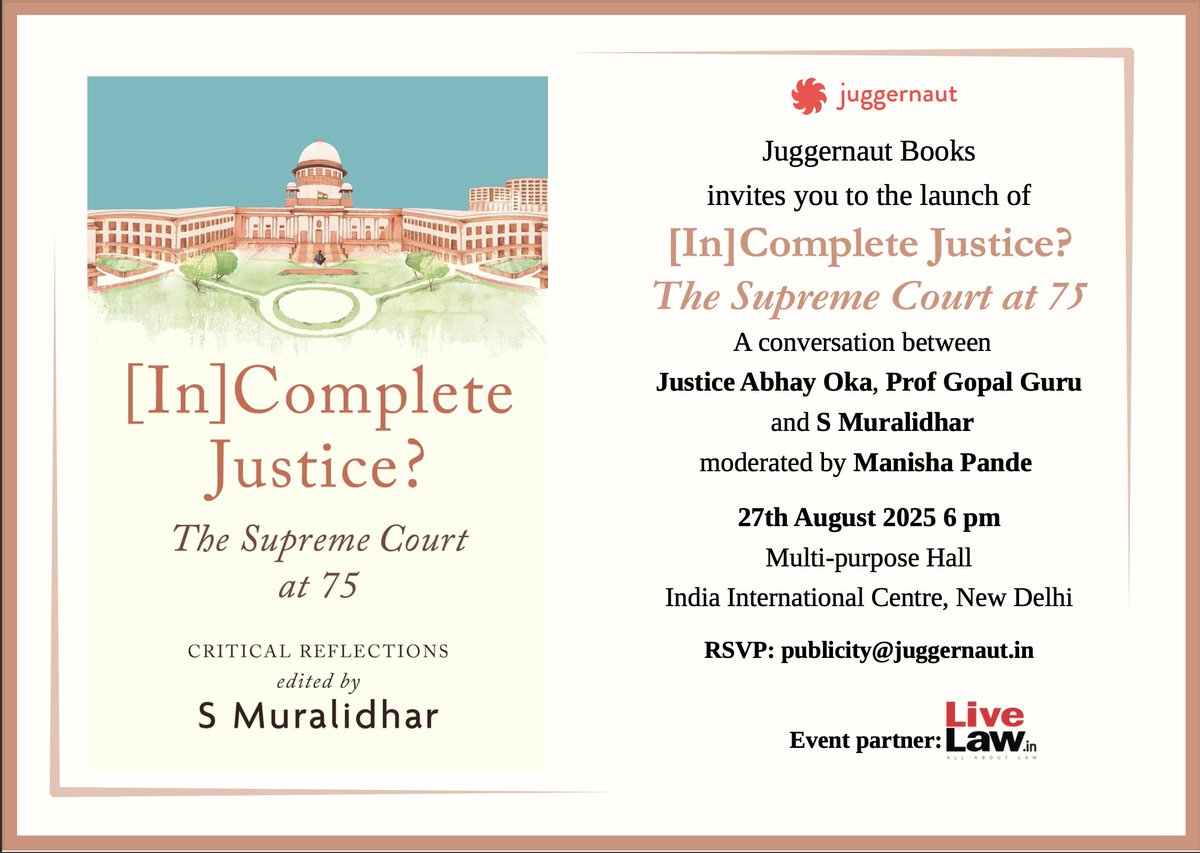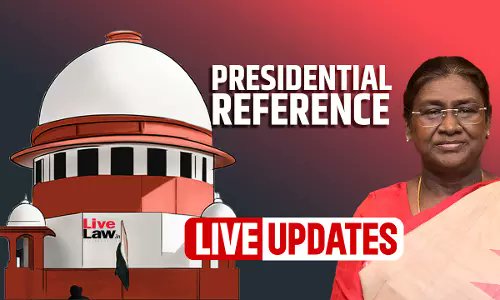#SupremeCourt constitution bench to continue hearing today Presidential Reference by President Droupadi Murmu(@rashtrapatibhvn) on 14 questions on the power to assent on Bills, including whether Court can fix timelines for the President/Governor to decide on Bills.
Those opposing reference to begin their arguments today.
Those opposing reference to begin their arguments today.
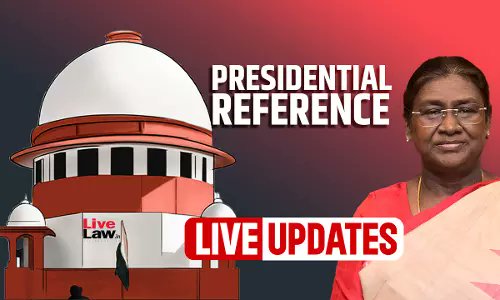
@rashtrapatibhvn Bench assembled.
SG: out of all questions, two questions- whether writ petition under Article 32/226 would lie at behest of government and second, scope of Article 361- Honourable President would like your opinion. Opinion is requested when situation arise or likely to arise-I am showing the view in TN judgment- there is a legal view decided.
@rashtrapatibhvn SG Mehta: None of us assisted but I am going to be the only one assisting on these issues.
reference to TN judgment made- this will have to be examined since questions will keep arising-this question of purely legal nature is justiciable.
reference to TN judgment made- this will have to be examined since questions will keep arising-this question of purely legal nature is justiciable.
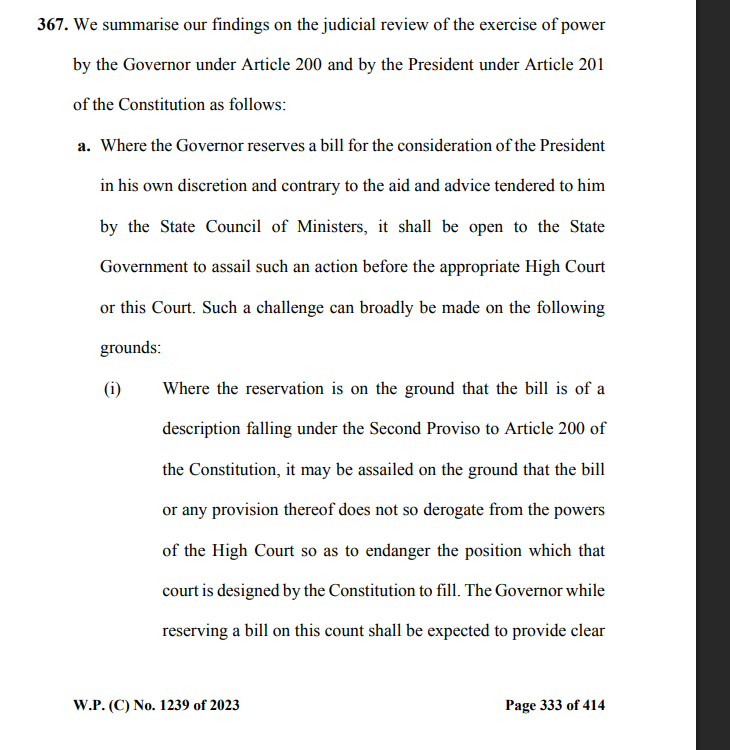
@rashtrapatibhvn SG Mehta: Under scheme of the constitution, whether a writ would lie against the Governor? Article 356 provides a contigency and mylords do not issue mandamus Governor but setting aside the order of the Governor recommending Presidential rule. 
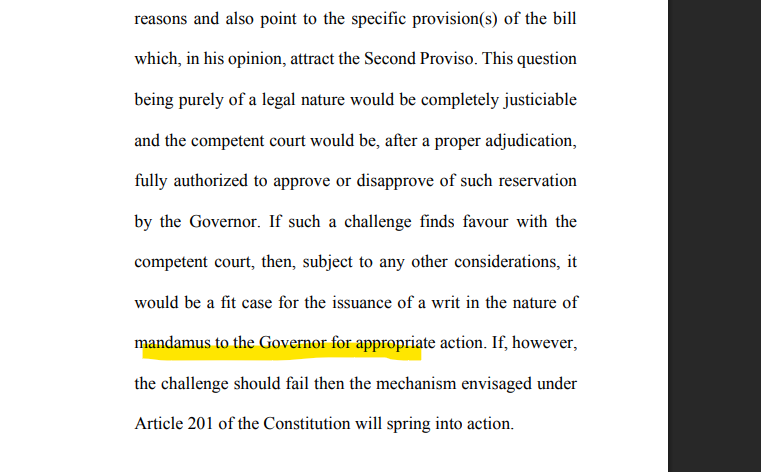
SG Mehta: There is time limit prescribed- Governor can't even be called upon. In substance, the court may not use that way but I am using- it says the President decide within 3 months and if she doesn't do it, come to us! After considerable debate, we decided that we must know what is the legal position.
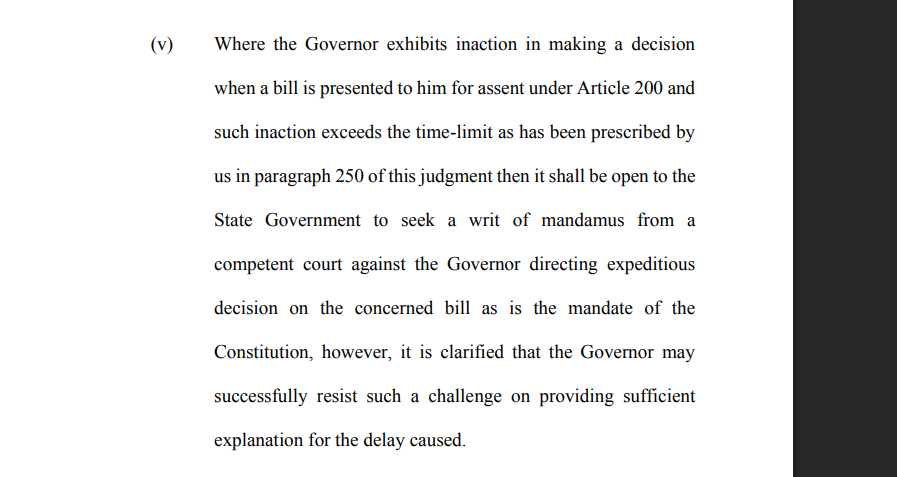
SG: First, whether writ petition under Article 32 would lie at behest of State Government? Two objections- a. 32 lies when violation of fundamental rights and state government constitutionally form does not have the fundamental right. It is a repository of functions which is to protect fundamental rights of others.
One judgment-house was prerogative and one member approached mylords on whether Article 32 would lie- bear one factor in mind, there are chapters under Constitution- Article 200 in chapter which starts with legislative procedure-Article 196 heading- provisions as to introduction and passing of Bills- that's how legislative process starts and goes to Article 200 and it culminatives when Governor exercises one of the four choices or President exercises Article 201 when bill reserved.
It has as much sanctity is that of the House when bill is passed. It is a part of a legislative process and question would be- can any part be subjected to writ jurisdiction?
One judgment-house was prerogative and one member approached mylords on whether Article 32 would lie- bear one factor in mind, there are chapters under Constitution- Article 200 in chapter which starts with legislative procedure-Article 196 heading- provisions as to introduction and passing of Bills- that's how legislative process starts and goes to Article 200 and it culminatives when Governor exercises one of the four choices or President exercises Article 201 when bill reserved.
It has as much sanctity is that of the House when bill is passed. It is a part of a legislative process and question would be- can any part be subjected to writ jurisdiction?
SG: similar judgment is where they say even private party can't come under Article 32 unless they show fundamental rights violation.
can one jurisdiction of the high court or supreme court be barred by another?- this issue arose when Karnataka came under Article 32 for water dispute- Court said we have Article 262 for inter-state disputes.
Possible argument that we are coming in representative capacity- they do represent the will of people but question is, would that entitle them to come under Article 32?
can one jurisdiction of the high court or supreme court be barred by another?- this issue arose when Karnataka came under Article 32 for water dispute- Court said we have Article 262 for inter-state disputes.
Possible argument that we are coming in representative capacity- they do represent the will of people but question is, would that entitle them to come under Article 32?
SG: mylords have exempted this when concerned petitioner is unable to approach
CJI: on account of social or economic [constraints]
SG: this would be very relevant- imagine a converse situation- a law and order situation has arisen where there is eruption of violence and local police is unable to contain it and if central government says you deploy paramilitary but State refuses- so can a central government file a petition under Article 32 seeking direction for state to deploy paramilitary? My answer is no.
CJI: on account of social or economic [constraints]
SG: this would be very relevant- imagine a converse situation- a law and order situation has arisen where there is eruption of violence and local police is unable to contain it and if central government says you deploy paramilitary but State refuses- so can a central government file a petition under Article 32 seeking direction for state to deploy paramilitary? My answer is no.
SG: American law, I generally do not cite but, in American constitution law, states can't assert as parens patriae under original jurisdiction- State there are completely independent and court have said these are federal issues. We have cited American cases that they said that you can't come to Supreme Court because these are political issues.
On Article 226- when would it empower entitle the high court- examine a situation, if the Governor grants assent- can someone aggreived by that can he challenge before high court and it issue mandamus?
CJI: that's a totally different situation, once law is implemented but question is, when Governor sits over a bill passed by legislature even on second occasion, can he sit time immemorial?
SG: justification will not confer jurisdiction. They choose to not undertake any political process otherwise other States...
On Article 226- when would it empower entitle the high court- examine a situation, if the Governor grants assent- can someone aggreived by that can he challenge before high court and it issue mandamus?
CJI: that's a totally different situation, once law is implemented but question is, when Governor sits over a bill passed by legislature even on second occasion, can he sit time immemorial?
SG: justification will not confer jurisdiction. They choose to not undertake any political process otherwise other States...
@rashtrapatibhvn CJI: earlier suggestion was 6 weeks but it was made as soon as possible- one member said the purpose was to make it immediately therefore, the framers expected that the Governor would decide expeditiously so can we ignore the expectations of the framers?
SG: what is the time limit depends on facts
CJI: we will not issue the words the two judge used but the Governor would not be justified in sitting over the bill for six months
SG: one constitutional organ not discharging his duties does not entitle the court to direct another constitutional organ...
CJI: yes, we know what your argument is- if this court does not decide the matter within 10 years, would it be justified for the President to issue an order
CJI: we will not issue the words the two judge used but the Governor would not be justified in sitting over the bill for six months
SG: one constitutional organ not discharging his duties does not entitle the court to direct another constitutional organ...
CJI: yes, we know what your argument is- if this court does not decide the matter within 10 years, would it be justified for the President to issue an order
SG: question is, can much a mandamus be issued? Suppose division bench says if the bill is referred to the President, the State comes here saying it is wrongly referred and therefore, we set aside the order of referring and we direct to grant assent- mylords have not issued mandamus to implement a law- because it would inevitably means that the direction is for making a law.
SG: by very nature and function of Governor, a writ of mandamus can't be filed and therefore, Article 226 would not lie. In this context, I have cited laws- here, governor who could not join as party- the two judge says the Governor will have to come and explain!
SR Bommai referred.
J Narasimha: are you saying that for all directions for Article 131?
SG: Article 131, mylords examine dispute between Union and State but Governor does not present the Union but the President.
CJI: How does he not represent the GOI? It is the GOI which entrust the authority to the Governor
SG: constitutionally speaking
CJI: in constituent assembly debates, framers said Governor is the vital link between Union and State.
SG: Is the Governor bound by aid and advise of Union Cabinet? Governor can either decide on aid and advise of State or his own discretion. He is reporting and answerable to the President.
SR Bommai referred.
J Narasimha: are you saying that for all directions for Article 131?
SG: Article 131, mylords examine dispute between Union and State but Governor does not present the Union but the President.
CJI: How does he not represent the GOI? It is the GOI which entrust the authority to the Governor
SG: constitutionally speaking
CJI: in constituent assembly debates, framers said Governor is the vital link between Union and State.
SG: Is the Governor bound by aid and advise of Union Cabinet? Governor can either decide on aid and advise of State or his own discretion. He is reporting and answerable to the President.
SG: in most cases, State Government appear and defend the Governors. On constitutional scheme, Article 154 says the executive power of State vests with the Governor. Article 155, Governor appointed on warrant by President. He is not the same thing as Union of India for the purpose of Article 131. It is for dispute between Central Government and States on issues of funds etc
J Narasimha: the actions of government, if at all he needs to answer, it will come throught he Government as said in Rameshwar Prasad
SG: through the state government; who will defend him if State is the petitioner? Central Gov can't come and defend him.
J Narasimha: the actions of government, if at all he needs to answer, it will come throught he Government as said in Rameshwar Prasad
SG: through the state government; who will defend him if State is the petitioner? Central Gov can't come and defend him.
@rashtrapatibhvn SG: Suppose a state passes a law that local language will be permitted and no other language, the Governor may wait for one year to cool down
@rashtrapatibhvn SG: mylords would be guided by four factors- nature of functions, stage of the process, constitutional choice under Article 200 is not binary, etc.
@rashtrapatibhvn SG: In Nebam Rebia, Governor was issued notice and it informed that Article 361 has immunity and the court withdrew the notice saying it should have not been issued
Sibal: but he appeared on his own and filed affidavit
J Nath: on his own violation he can come
Sibal: but he appeared on his own and filed affidavit
J Nath: on his own violation he can come
@rashtrapatibhvn SG: See the devastating effect- suppose Governor refers back to the House, some private citizen would come for violation- neither Article 32/226 at behest of State/individual is not available and even Article 131 because it is for Centre and the State dispute.
@rashtrapatibhvn SG: If governor can't be answerable and there is dispute between Union and State, who defends him?
SG Mehta concludes.
Sr Adv Siddharth Luthra(for Andhra Pradesh): since we filed Article 32, I want to reserve my right to seek instructions.
SG Mehta concludes.
Sr Adv Siddharth Luthra(for Andhra Pradesh): since we filed Article 32, I want to reserve my right to seek instructions.
@rashtrapatibhvn CJI: we are not permitting one than one counsel to appear for each State
Sr Adv Abhishek Manu Singhvi: we will sort it out at lunch.
Singhvi begins.
Sr Adv Abhishek Manu Singhvi: we will sort it out at lunch.
Singhvi begins.
@rashtrapatibhvn Singhvi: three bigger issues I am dealing- 1. the whole concept of discretion, lack of it, degree of it under A. 200. 2. questions 3, 4, 6 and 9- broadly judicial review, justiciability etc 3. timelines and then, briefly question 8, 10, 11, and 12.
Singhvi (@DrAMSinghvi) : Article 200- 1. the governor and President are titular head functioning within Parliamentary form of government bound by aid and advice and no discretion except where provided
CJI: what about Article 163
Singhvi: fully dealt with.
2. there is strong material in Shamsher and Nebam and in constitutent assembly that each of three options in Article 200, the Governor is bound by advice of ministry and even for reserving for President. There are materials suggesting that. Intention was even for council of ministers to guide him when to refers.
3. The Governor in any event has 3 options and if he chooses not to assent, he may, even not be bound by advice, return or refers when he first refers to the bill.
4. no called fourth option for bill to fall through-withholding assent simplicter
5. no fifth option sending the bill for presidential assent after exercising the second option for returning the Bill to assembly
CJI: what about Article 163
Singhvi: fully dealt with.
2. there is strong material in Shamsher and Nebam and in constitutent assembly that each of three options in Article 200, the Governor is bound by advice of ministry and even for reserving for President. There are materials suggesting that. Intention was even for council of ministers to guide him when to refers.
3. The Governor in any event has 3 options and if he chooses not to assent, he may, even not be bound by advice, return or refers when he first refers to the bill.
4. no called fourth option for bill to fall through-withholding assent simplicter
5. no fifth option sending the bill for presidential assent after exercising the second option for returning the Bill to assembly
Singhvi: The discretion envisaged under Article 200 is envisaged only to the second proviso which is misread to say he generally has discretion.
Former President called him friend, philospher guide and according to me, he is a friend, philosopher to exercise functions- he will be a man above party and will be able to influence ministers to administer the functions.
CJI: we also recognise that he may have discretion
Singhvi: of course, he does in five or six articles including Article 200 only to the extent of second proviso. 1935 Act had discretion in opening part and in proviso, in first round of assembly, they removed in first part and idea was to give discretion is second proviso. Article 200 and 163 is not blanket provision.
Ambedkar calls him ornamental.
Former President called him friend, philospher guide and according to me, he is a friend, philosopher to exercise functions- he will be a man above party and will be able to influence ministers to administer the functions.
CJI: we also recognise that he may have discretion
Singhvi: of course, he does in five or six articles including Article 200 only to the extent of second proviso. 1935 Act had discretion in opening part and in proviso, in first round of assembly, they removed in first part and idea was to give discretion is second proviso. Article 200 and 163 is not blanket provision.
Ambedkar calls him ornamental.
@rashtrapatibhvn @DrAMSinghvi Singhvi argues that the election of Governor reflects the fact that he is ornamental and nothing else. 

Singhvi: very sorry to say, some para read by SG said that in these matters, the Governor will have to hold the Bill back- nine doomsday scenario which never happened in 75 years such as State enacts local language etc are given. Mylords have said don't judge constitutional adjudication on disasters.
Singhvi: in many judgments, Article 200 is given for discretion but it does not add what Shamsher Singh adds-"Again Article 200 requires the Governor to reserve for consideration any Bill which in his opinion if it became law, would so derogate from the powers of the High Court as to endanger the position which the High Court is designed to fill under the Constitution."
@rashtrapatibhvn @DrAMSinghvi Singhvi: J Iyer said this cuts to the root of democracy if governor has discretion- 

@rashtrapatibhvn @DrAMSinghvi Singhvi: according to Mehta, Governor can judge friendly relations, political process etc- but see what the judges said 40 years ago- 

@rashtrapatibhvn @DrAMSinghvi Singhvi: no doubt the Governor is part of legislative process but he is not a part of the legislative process. 

Singhvi: he can't have dominating powers
CJI: that's what we have been asking the Solicitor
Singhvi: submission is also refusal back also includes Monday Bill, I went back to the Constitution thinking I made some mistake. It was supported by A. 207. In Parliament, Friday afternoons are for private member Bills, only 5 have been passed in history as of now.
A.207 was enacted that for financial bill that you can't have private member bill but only in support of Cabinet. This is made to supports that Governor is a super-Chief Minister!
CJI: that's what we have been asking the Solicitor
Singhvi: submission is also refusal back also includes Monday Bill, I went back to the Constitution thinking I made some mistake. It was supported by A. 207. In Parliament, Friday afternoons are for private member Bills, only 5 have been passed in history as of now.
A.207 was enacted that for financial bill that you can't have private member bill but only in support of Cabinet. This is made to supports that Governor is a super-Chief Minister!
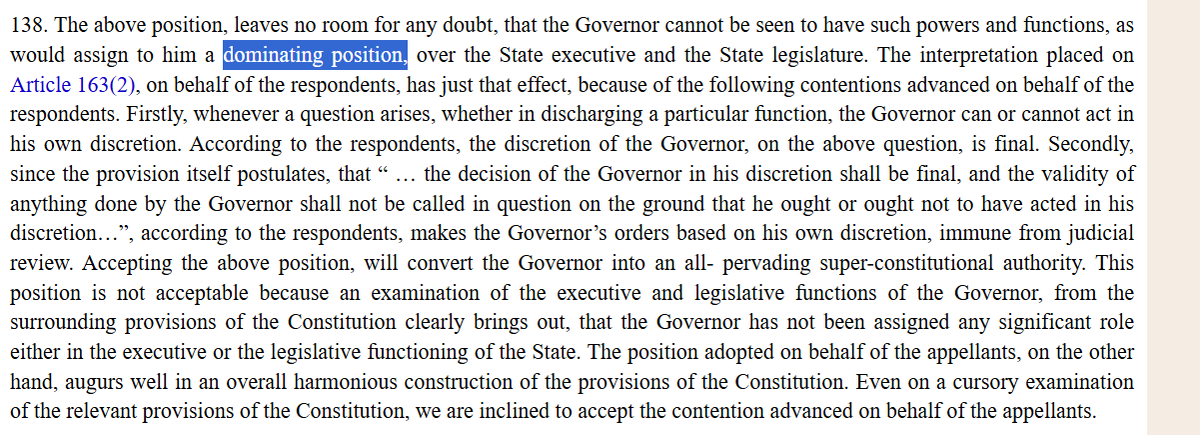
@rashtrapatibhvn @DrAMSinghvi Singhvi: Rebia says- Governor has been given express discretion and even exercises those, he is amenable to judicial review. 

@rashtrapatibhvn @DrAMSinghvi Singhvi answering the reference made by SG that Article 163 talks about his general discretion- 

@rashtrapatibhvn @DrAMSinghvi Arguments to continue post lunch.
@rashtrapatibhvn @DrAMSinghvi Singhvi: 'exception in so far' expression under Article 163- constitutent assembly debate being read- 
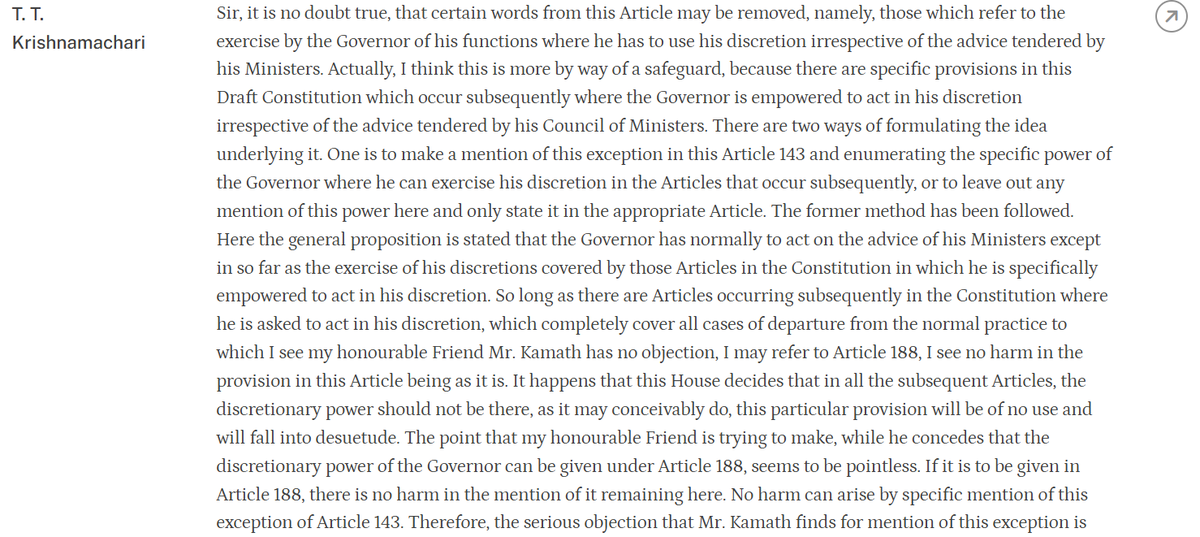
@rashtrapatibhvn @DrAMSinghvi Singhvi says this whole argument of general discretion with Governor will create chaos while referring to the debates.
@rashtrapatibhvn @DrAMSinghvi Singhvi: I have done now with my proposition that on such general discretion was not envisaged. The thrust is clear that you are not there without specifically conferred discretion.
Singhvi: there is strong material in Shamsher and Nebam and at least three speeches in CAD that all options-assent, withholding and reserving are only intent to facilitate law making. Ultimately Governor is only facilitating. Why have second option sending back? There are many situations where Governor wants rethinking. On third option, the Government frequently knows that this requires Presidential assent or the Government is in doubt that there is competence issue
CJI: if Governor has doubt that there is repugnancy
Singhvi: he has discretion.
CJI: that's your alternative issue?
Singhvi: yes, that he has limited discretion
J Narasimha: what happens in 286, 287 when Bill comes to him because then the council will not advice?
Singhvi: he has no option. the bill may be illegal...constitutional scheme will not change in terms of aid and advice
J Narasimha: once it comes back, he has no option-is there a possibility for him to reference to President now?
Singhvi: the entire structure of Article 200 is the initial stage structure. He can take changes, the referral back can be a device to send it to President.
CJI: if Governor has doubt that there is repugnancy
Singhvi: he has discretion.
CJI: that's your alternative issue?
Singhvi: yes, that he has limited discretion
J Narasimha: what happens in 286, 287 when Bill comes to him because then the council will not advice?
Singhvi: he has no option. the bill may be illegal...constitutional scheme will not change in terms of aid and advice
J Narasimha: once it comes back, he has no option-is there a possibility for him to reference to President now?
Singhvi: the entire structure of Article 200 is the initial stage structure. He can take changes, the referral back can be a device to send it to President.
Singhvi: In A. 200, neither main clause or proviso leaves discretion for Governor...it may be stated conceptually, the structure provides for three options read with first proviso which tells the methodology and manner.
CJI: that's what is done by two judge bench, though we are not in appeal
Singhvi:in respect of the second option, it is entirely possible that the assembly wants to reconsider some options or put it on hold and in such situation can't be customised and in such situation the assembly can bind in aid and advice for the return. Similarly, State can decide that certain situation requires Presidential reference....certain provisions expressly requires presidential option-286, 304 etc.
Section 75, GOI Act 1935-two discretion in body and proviso. In draft constitution prepared, the word discretion was removed from main clause but retained in proviso-the Governor may in his discretion return-one possibility is it is bound by aid and advice.
It came to drafting committee, it retained in the proviso. Now, Dr Ambedkar consciously move amendment to remove discretion in the proviso as well.
CJI: that's what is done by two judge bench, though we are not in appeal
Singhvi:in respect of the second option, it is entirely possible that the assembly wants to reconsider some options or put it on hold and in such situation can't be customised and in such situation the assembly can bind in aid and advice for the return. Similarly, State can decide that certain situation requires Presidential reference....certain provisions expressly requires presidential option-286, 304 etc.
Section 75, GOI Act 1935-two discretion in body and proviso. In draft constitution prepared, the word discretion was removed from main clause but retained in proviso-the Governor may in his discretion return-one possibility is it is bound by aid and advice.
It came to drafting committee, it retained in the proviso. Now, Dr Ambedkar consciously move amendment to remove discretion in the proviso as well.
@rashtrapatibhvn @DrAMSinghvi Singhvi: on SG submission that they had parallel main clause-wrong submission.
@rashtrapatibhvn @DrAMSinghvi Singhvi: there are three options- this discussion of discretion arises in second and third option- Ambedkar says that in responsible government, there can be no room of discretion for Governor. The intent is clear.
@rashtrapatibhvn @DrAMSinghvi Singhvi: Shamsher Singh accepts deletion of discretion and says "tiny strips" of discretion available for Governor: 

@rashtrapatibhvn @DrAMSinghvi CJI: but Article 163(2) can't be said to be tiny strip
Singhvi: its not implied discretionary tank of power. It has to be subordinate to the overll scheme of the Constitution.
Singhvi: its not implied discretionary tank of power. It has to be subordinate to the overll scheme of the Constitution.
@rashtrapatibhvn @DrAMSinghvi Singhvi: my third head is he has three options and let us accept for two and three, he is not bound by aid and advice-in any event, the Governor does not have any fourth option available to him.
Singhvi: it would incentivise the Governor to hold on indefinitely a Bill because Governor would know that it is mandatory to send it back the second time- you make the first proviso zero because then why should he do it at all? absurd negative, entire concept of first proviso liquidated.
Singhvi: Article 199(3) decides if a bill is money bill or not, as a Speaker I certificate it and it is sent back Governor and he withholds it
SG: I never said money bill can be withheld
Singhvi: Mr Salve argued that it will apply to money bill also and Mr Mehta also supported and invoked Article 207. He said it is not neccesary to have exemption because money bill will come with recommendation of the Governor only
SG: I never said money bill can be withheld
Singhvi: Mr Salve argued that it will apply to money bill also and Mr Mehta also supported and invoked Article 207. He said it is not neccesary to have exemption because money bill will come with recommendation of the Governor only
Singhvi:' [reads Article 199(3)]-decision of Speaker on money bill is final-see the implication of withholding money bill-see the proviso-return the bill if its not money bill-207 is the answer to the money bill because Governor would have recommended it-completely wrongly invoked
@rashtrapatibhvn @DrAMSinghvi Singhvi: purpose of A. 207 is to bar a private member to move money bill and even then, the governor is bound.
Singhvi: learned Solicitor that Article 207 requires recommendation of Governor and consequently even money bill can be withheld is completely misplaced because it is intended for something completely different- 207 does not give any special government of discretion to the Governor as said in Valluri.

Singhvi: it is completely artifical distinction dichotomy made between withholding and returning- withholding must lead to return. There aren't separate options.
Proviso is directly linked to the second option-withholding is the first step and returning is the second step. Last line-shall not withhold assent is the same as the body
CJI: first option is to give assent, third is to send to President
Singhvi: that's why the proviso meant for the second option. Saying he can withhold simplicter, it will make a mockery of whole proviso
Proviso is directly linked to the second option-withholding is the first step and returning is the second step. Last line-shall not withhold assent is the same as the body
CJI: first option is to give assent, third is to send to President
Singhvi: that's why the proviso meant for the second option. Saying he can withhold simplicter, it will make a mockery of whole proviso
Singhvi: imagine the harm we are causing to settled scheme- opening words of A.200 are short-either he assents, withholds assent therefrom and reserves.
Middle word is or that he withholds- Constitution chooses not to be silent as to what happens when you withhold assent that proviso must follow.
CJI: otherwise the word as soon as possible will be rendered otiose if you withhold for eternity
Middle word is or that he withholds- Constitution chooses not to be silent as to what happens when you withhold assent that proviso must follow.
CJI: otherwise the word as soon as possible will be rendered otiose if you withhold for eternity
Singhvi: can you return a bill without withholding? second argument, as soon as possible becomes useless because there is a fourth option of eternity. We have a chart of Telangana, AP, Tamil Nadu bills- indefinitely semi-permanent withholding-20 examples
SG: I have many such bills then, we are not arguing on facts
CJI: whatever we are laying down, we won't lay down for a particular party; we will be interpreting Article 200.
Singhvi: premature intervention; it is nothing to do with adjudication of facts. I have giving chart where it is pending for 3 years before Governor and one year before President
SG: I have many such bills then, we are not arguing on facts
CJI: whatever we are laying down, we won't lay down for a particular party; we will be interpreting Article 200.
Singhvi: premature intervention; it is nothing to do with adjudication of facts. I have giving chart where it is pending for 3 years before Governor and one year before President
Singhvi: doctrine of law-purposive interpretation. Two points- withhold assent is the focus of the proviso and second, as soon as possible becomes meaningless if such interpretation is accepted.
Third aspect, withhold or returning are not mutually contradictory, it signifies parts of the same component. Provisos have to be read in the connect in which they are read.
In Punjab, we saw the whole scheme of Article 200.
Third aspect, withhold or returning are not mutually contradictory, it signifies parts of the same component. Provisos have to be read in the connect in which they are read.
In Punjab, we saw the whole scheme of Article 200.
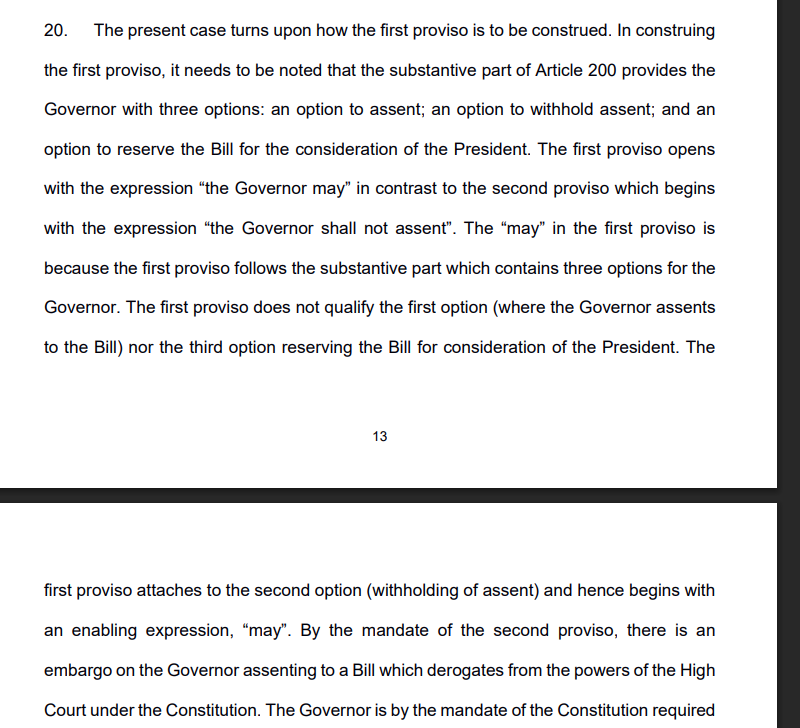
Singhvi: second proviso is given all weight and first proviso is not related to second option-how can we interpret proviso like this? unheard of- the argument can be you must overrule the three judge bench because there is no other way! it is contrary to the previous judgment that the bill falls through
CJI: it uses the word 'unless'
CJI: it uses the word 'unless'
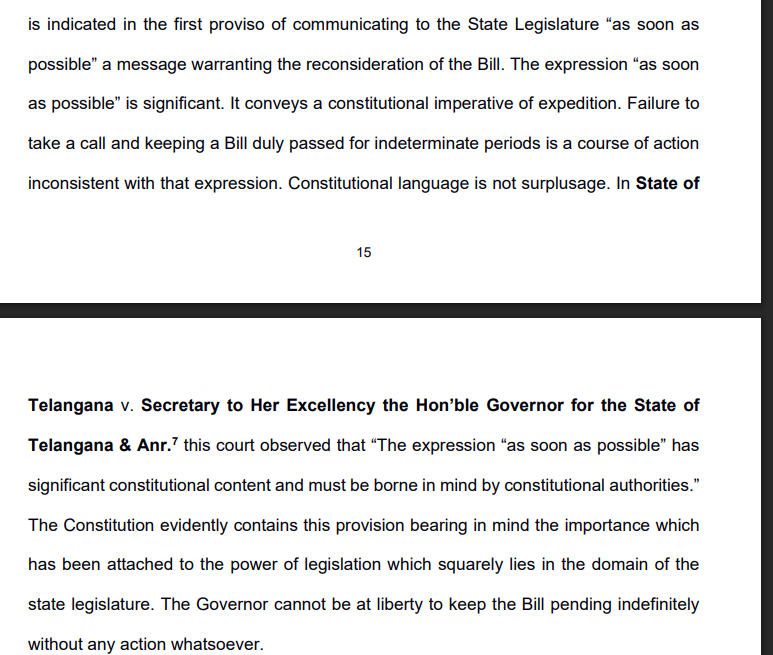
CJI: how will you take the two other judgments where it is said that if the Governor does not take the option of proviso, the bill falls through?
Singhvi: Valluri and Rakmeshwar has nothing to do with that subject but it says that if the State does not sends it back, it falls through. One word is taken up to say...
J Nath: your argument is that he has to mandatorily send it back then why may is used?
Singhvi: may is meant that he, in a particular circumstance, wants to withhold assent and he may then send it back. This happens after you withhold assent.
J Nath: why complicate it with may and shall
Singhvi: may in proviso links to previous line-three options he has which may not arise in first and third, and in second, once you reach that option, there is no further option. Falls through happen when State may not spend it back...the may does not give him option that he never sends it back to State. Textually, the proviso has to be in 'shall' the moment he withholds assent.
Singhvi: Valluri and Rakmeshwar has nothing to do with that subject but it says that if the State does not sends it back, it falls through. One word is taken up to say...
J Nath: your argument is that he has to mandatorily send it back then why may is used?
Singhvi: may is meant that he, in a particular circumstance, wants to withhold assent and he may then send it back. This happens after you withhold assent.
J Nath: why complicate it with may and shall
Singhvi: may in proviso links to previous line-three options he has which may not arise in first and third, and in second, once you reach that option, there is no further option. Falls through happen when State may not spend it back...the may does not give him option that he never sends it back to State. Textually, the proviso has to be in 'shall' the moment he withholds assent.
@rashtrapatibhvn @DrAMSinghvi Singhvi: if he withholds indefinitely-he powers become larger than Article 200-dominating will. Mylords have read may as shall hundreds of time.
Kameshwar wrongly applied.
Kameshwar wrongly applied.
Singhvi: third option- each of the three are mutually exclusive since disjunctive 'or' is used. Valluri says these are non-overlapping options. It is contrary against everything to allow Governor to use reference after return
CJI: suppose he find repugnacy to the central statute and reconsiders and if legislative passes without any modification, it can't be reserved?
Singhvi: he's reference is bound by aid and advice in the first option. On second basis, I send him bill and he finds
CJI: in his wisdom he gives an opportunity to the legislature and if better sense prevails
Singhvi: he can do by referring it first but he can't do it second because it then violates the first proviso. If there is repugnancy, he is not a judicial reviewer. Somebody said, the elected government has duty to do right but it can do wrong and that's why it is the court which can set it right
J Narasimha: CJI's question was on the interpretation of the proviso
CJI: suppose he find repugnacy to the central statute and reconsiders and if legislative passes without any modification, it can't be reserved?
Singhvi: he's reference is bound by aid and advice in the first option. On second basis, I send him bill and he finds
CJI: in his wisdom he gives an opportunity to the legislature and if better sense prevails
Singhvi: he can do by referring it first but he can't do it second because it then violates the first proviso. If there is repugnancy, he is not a judicial reviewer. Somebody said, the elected government has duty to do right but it can do wrong and that's why it is the court which can set it right
J Narasimha: CJI's question was on the interpretation of the proviso
Singhvi: you may have had provision for second option- you have to leave it to the court. When you had first chance, the legislature had two chances-somebody said, mylords are right because you are final.
He has no business in repugnancy but if it is so repugnant, why not use the first reference to send it to President of India.
He has no business in repugnancy but if it is so repugnant, why not use the first reference to send it to President of India.
CJI: what about bill falls through?
Singhvi: when the State does not return the Bill. The proviso and second option
CJI: it does not say the Government has to mandatorily return it
Singhvi: please see Mr Mehta's para 100(examples are given)-this is a basis for saying Governor should be given judicial review powers-mylords have said that this is not the way to do constitutional adjudication looking at extreme scenarior.
Singhvi: when the State does not return the Bill. The proviso and second option
CJI: it does not say the Government has to mandatorily return it
Singhvi: please see Mr Mehta's para 100(examples are given)-this is a basis for saying Governor should be given judicial review powers-mylords have said that this is not the way to do constitutional adjudication looking at extreme scenarior.
Singhvi: falls through means it has to go back and not come back.
Kameshwar judgment is dealing with a completely different issue.
CJI: why does it says unless
Singhvi: if the state does not return it, the bill falls through
J Nath: then there is no question of Governor granting assent
Singhvi: nobody has plucked out these words
J Narasimha: where is the concept of falling through? the bill lapses. It has created much problem in its interpretation but if it goes back, falls through is not the correct option
Singhvi: mylords are right but fortunately they have added 'unless'. Suppose if the Government sends it back, will the bill fall through? We are considering whether withholding simplicter is a head by itself. Sub arguments are that I hold it back and it falls through-as subjective absolute discretion-everything I read about discretion nullifies. It swallows the entire article.
Kameshwar judgment is dealing with a completely different issue.
CJI: why does it says unless
Singhvi: if the state does not return it, the bill falls through
J Nath: then there is no question of Governor granting assent
Singhvi: nobody has plucked out these words
J Narasimha: where is the concept of falling through? the bill lapses. It has created much problem in its interpretation but if it goes back, falls through is not the correct option
Singhvi: mylords are right but fortunately they have added 'unless'. Suppose if the Government sends it back, will the bill fall through? We are considering whether withholding simplicter is a head by itself. Sub arguments are that I hold it back and it falls through-as subjective absolute discretion-everything I read about discretion nullifies. It swallows the entire article.
@rashtrapatibhvn @DrAMSinghvi Arguments to continue on 2nd September.
• • •
Missing some Tweet in this thread? You can try to
force a refresh

